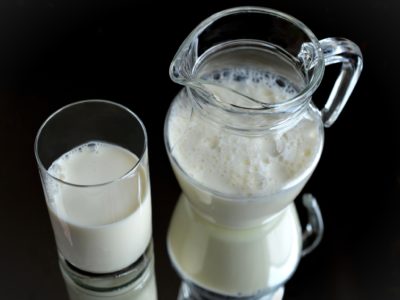Coconut milk is traditionally pressed from the grated white inner flesh of a brown coconut and mixing the resulting substance with a small amount of water. Several grades of coconut milk exist. “Thick” coconut milk, also known as “full fat” and usually simply labeled as “coconut milk” on a can, is 20-22% fat; it is the first milk obtained from the grated coconut meat. “Thin” coconut milk, also labeled as “light” or “low fat”, is 5-7%; it is made by soaking the already squeezed grated coconut milk in water for a second pressing.
Coconut fat (including the fat in coconut milk) is about 60% Medium Chain Triglycerides (MCTs). MCTs have diverse health benefits because they don’t require bile salts to be absorbed in the small intestine (being passively absorbed, they enter the bloodstream very quickly, and can even be easily digested by people without a gallbladder). MCTs are rapidly converted into ketone bodies by the liver. Ketone bodies are water-soluble molecules normally produced as intermediates or by-products when the body mobilizes (accesses) fat stores. Ketone bodies (at least two of the three types) can be readily used as fuel by every cell and are the brain’s preferred fuel source in the absence of glucose or in the presence of insulin resistance (which is why supplementing with MCT oil has been shown to be so beneficial in neurodegenerative disorders such as Alzheimer’s disease). Dietary MCTs have been shown to radically reduce the production of a variety of proinflammatory cytokines (meaning they reduce inflammation), increase activity of the histamine-clearing enzyme diamine oxidase (great for histamine intolerance and allergy), increase mucus production (great for gut barrier health), and support gut-barrier healing (by increasing cell-turnover rate in the gut). However, MCTs can also increase the secretion of IgA antibodies in the gut (specifically in the Peyer’s patches), which may be problematic for some people, despite all the other benefits. If you have any reaction to coconut or palm oil, switch to other healthy fats for your cooking.
Coconut milk is also high in manganese, magnesium, iron and phosphorous, with a good amount of potassium, zinc, and B-vitamins.
Coconut milk can be made at home by processing grated coconut with hot water, which extracts the oil and aromatic compounds. It typically has a fat content of 17-24% depending on the fat level of the coconut meat and the quantity of added water.
When coconut milk is refrigerated and left to set, coconut cream will rise to the top and separate out from the milk. To avoid this in commercial coconut milk, an emulsifier and a stabiliser have to be used, which is why guar gum is such a common ingredient in canned coconut milks. If purchasing canned or powdered coconut milk, make sure to opt for brands that skip the emulsifiers.
My favorite canned coconut milk brand is Natural Value, and Arroy-D is a good brand as well. I also love to have coconut milk powder on hand for its convenience and versatility.


 Coconut
Coconut